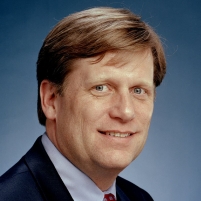Ambassador-Designate to Russia: Who is Michael McFaul?
Sunday, July 31, 2011

A Stanford University professor with no prior diplomatic experience but a great deal of experience studying Russia, Michael Anthony McFaul was nominated to be U.S. ambassador to Russia by President Barack Obama in May 2011. However, the Senate has yet to take up his nomination. McFaul has served as President Barack Obama’s top adviser on Russian relations since the beginning of his administration.
Born in 1963 in Glasgow, Montana, McFaul earned a Bachelor of Arts in international relations and Slavic languages and a Master of Arts in Slavic and East European studies from Stanford University in 1986.
From 1988 to 1990, he was a research fellow at the Center for International Security and Arms Control at Stanford University. During 1990-1991, McFaul was a visiting research fellow at the Hoover Institution and a visiting scholar at Moscow State University.
He was a Rhodes Scholar and earned a PhD in international relations from Oxford University in 1991.
McFaul returned to Stanford in 1992, where he remained until receiving his ambassadorial appointment. He was a research associate at the Center for International Security and Arms Control and co-director of the program on defense conversion in Russia until 1994.
In 1995, he joined the Department of Political Science as an assistant professor. That same year he became a research fellow at the Hoover Institution and remained in this capacity until 2003.
He was promoted to associate professor in 2002, and beginning in 2003, was named the Peter and Helen Bing Senior Fellow at the Hoover Institution and became the co-director of the Iran Democracy Project.
In 2005, he was named the director of the Center on Democracy, Development and Rule of Law at the Freeman Spogli Institute at Stanford. The following year he became deputy director of the Freeman Spogli Institute for International Studies, and served as its acting director in 2007. Also that year he was elevated to professor in the political science department.
In addition to his Stanford work, McFaul has held several positions at the Carnegie Endowment for International Peace, including senior associate and director of the Russian Domestic Politics Program.
Prior to his nomination to the ambassadorial position, McFaul served on the National Security Council as special assistant to the president on Russian relations. He is only the second non-diplomat to be sent to Moscow in the past 30 years.
McFaul’s current research interests include U.S.-Russian relations in the 1990s, Russian electoral trends, post-communist regime change, and American foreign policy.
He has published numerous books and articles on Russian politics and other subjects. These works include Advancing Democracy Abroad: Why We Should and How We Can(2009); Between Dictatorship and Democracy: Russian Postcommunist Political Reform (2004); Russia’s Unfinished Revolution: Political Change from Gorbachev to Putin (2001); Russia's 1996 Presidential Election: The End of Polarized Politics (1997); and The Troubled Birth of Russian Democracy (1993).
He has served on the editorial boards of Current History, Journal of Democracy, Demokratizatsiya, Perspectives on European Politics and Society, Post-Soviet Affairs, and The Washington Quarterly. He also has served as a consultant for numerous companies and government agencies.
-Noel Brinkerhoff
CV (Stanford University)
Profile (Wikipedia)
- Top Stories
- Unusual News
- Where is the Money Going?
- Controversies
- U.S. and the World
- Appointments and Resignations
- Latest News
- Musk and Trump Fire Members of Congress
- Trump Calls for Violent Street Demonstrations Against Himself
- Trump Changes Name of Republican Party
- The 2024 Election By the Numbers
- Bashar al-Assad—The Fall of a Rabid AntiSemite






Comments